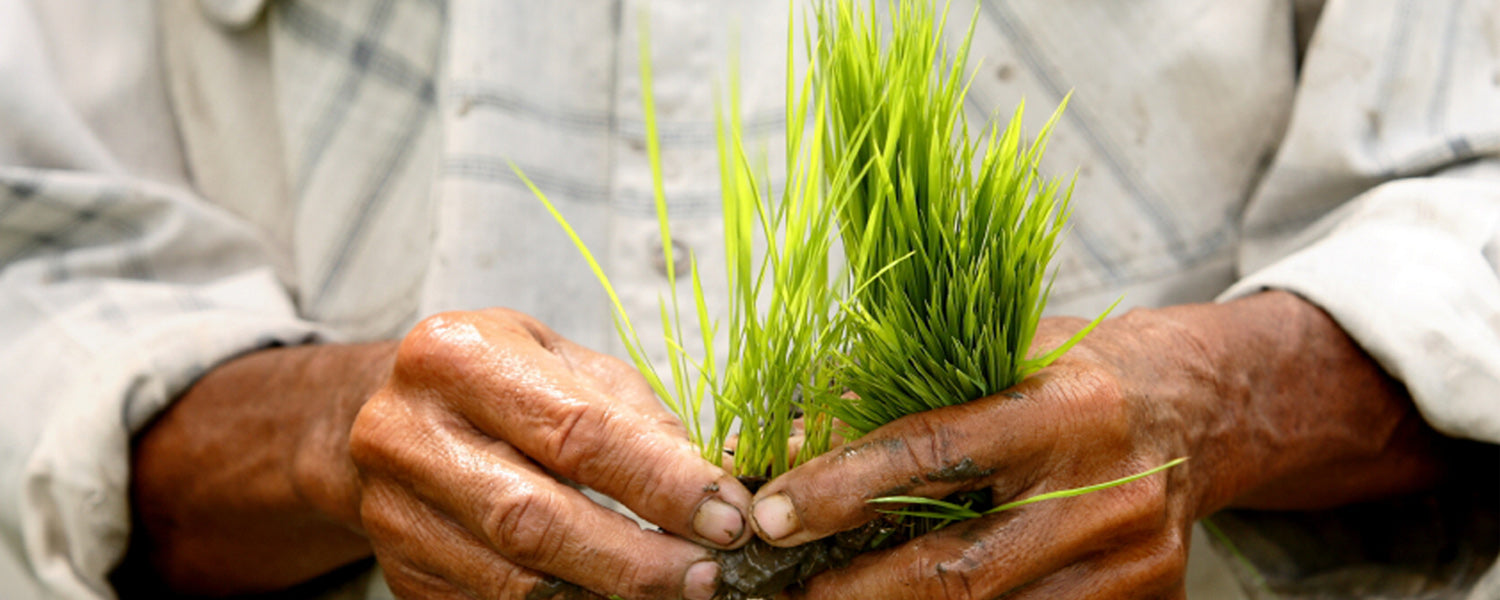Fair Trade Principles
Fair trade is based on a few fundamental principles:
Producers are paid fair prices
 Sunria not only gives premium prices, but also helps empower farmers so they can do more, so that farmers have the opportunity to earn value-added income. We have helped trained the rice farmers, so they can mill their own paddies, and understood how to carry out the different steps with care, so they can produce high-quality milled rice.
Sunria not only gives premium prices, but also helps empower farmers so they can do more, so that farmers have the opportunity to earn value-added income. We have helped trained the rice farmers, so they can mill their own paddies, and understood how to carry out the different steps with care, so they can produce high-quality milled rice.
Ensuring there is no child labor
 A lot of products can be economically produced from developing countries because its producers are children. They are paid very low wages, and are deprived of the opportunity to continue receiving education. Unlike child work, which are activities considered to help the development of a child, and do not interfere with the schooling, such as helping parents with home chores, or earning pocket money during school holidays, child labor is defined by International Labor Organization as:
A lot of products can be economically produced from developing countries because its producers are children. They are paid very low wages, and are deprived of the opportunity to continue receiving education. Unlike child work, which are activities considered to help the development of a child, and do not interfere with the schooling, such as helping parents with home chores, or earning pocket money during school holidays, child labor is defined by International Labor Organization as:
“Work that deprives children of their childhood, their potential and their dignity, and that is harmful to physical and mental development.”
Indonesia is estimated to have 6,5 million child laborers, due to economic pressure. There is a lack of implementation of sanction for employer who hires child laborers. The problem is also worsened due to the societal norms, with parents encouraging their own child to work so they can “contribute” to their families through their pay. Read more about this situation here.
At Sunria, we do not tolerate child labor. A part of the reason why we give premium prices to the farmers is to strengthen their financial position, so their children can concentrate on going to school.
Good working conditions for producers
 With increased global competition, many companies reduce their production costs, and ignore health and safety aspects for their producers. This problem is more pronounced in developing countries such as Indonesia. At Sunria, we ensure that our farmers’ facilities have confirmed to the health and safety standards to the national laws, and additionally fair trade certification standards.
With increased global competition, many companies reduce their production costs, and ignore health and safety aspects for their producers. This problem is more pronounced in developing countries such as Indonesia. At Sunria, we ensure that our farmers’ facilities have confirmed to the health and safety standards to the national laws, and additionally fair trade certification standards.
We help them identify areas of improvement, and assist them to make it better. Most of the time, the farmers do not realize that the small things or actions can make a big difference. Previously, farmers overlook the importance of having a fire extinguisher in their mill. Now, they understood its importance and it became an indispensable item in their facilities.
Democratic decision-making
 In developing countries like Asia, decision-making usually involves only a select few at the top, and workers’ opinions often do not matter. We engage our farmers in democratic decision-making process, especially in matters directly affect their welfare, such as prices, and community development. Everyone is encouraged to participate and has an equal voice.
In developing countries like Asia, decision-making usually involves only a select few at the top, and workers’ opinions often do not matter. We engage our farmers in democratic decision-making process, especially in matters directly affect their welfare, such as prices, and community development. Everyone is encouraged to participate and has an equal voice.
Commitment to non-discrimination, and gender equity
 In Indonesia, gender discrimination is a pressing issue. According to the Gender Inequality Index under Human Development Index 2011 by United Nations, Indonesia is ranked 100 out of 146 countries. Although Indonesia has introduced a number of reforms to advance gender equality, significant challenges still remain, especially economic empowerment, with only 53% of women engaged in the labor market, compared to 87% of men.
In Indonesia, gender discrimination is a pressing issue. According to the Gender Inequality Index under Human Development Index 2011 by United Nations, Indonesia is ranked 100 out of 146 countries. Although Indonesia has introduced a number of reforms to advance gender equality, significant challenges still remain, especially economic empowerment, with only 53% of women engaged in the labor market, compared to 87% of men.
Sunria promotes and support the role of women in farming and its post-harvest processing. The planting, weeding, harvesting, and sorting of Sunria rice is carried out by women.
We also additionally try to find other ways to empower women within the local communities and give them more flexibility. We started an initiative to make handcrafted packaging, so far it has offered women within the local community an opportunity to have sustainable income, while allowing them to be at home and look after their kids.
Respecting and preserving the environment
 Our planet has encountered many environmental challenges, and we believe that all of us can contribute and do our part. Fair Trade Certified environmental standards are some of the strictest in the industry. Fair Trade ensures that farmers follow internationally monitored environmental standards. Fair Trade Certified products are not only better for the men and women who grow them, they’re better for the planet as well!
Our planet has encountered many environmental challenges, and we believe that all of us can contribute and do our part. Fair Trade Certified environmental standards are some of the strictest in the industry. Fair Trade ensures that farmers follow internationally monitored environmental standards. Fair Trade Certified products are not only better for the men and women who grow them, they’re better for the planet as well!
Through sustainable farming, Sunria farmers are helping to preserve the earth for future generations. We use local inputs to make organic compost to enhance soil fertility. We promote a healthy ecosystem for our plants to grow. We minimize our water usage, and reuse and recycle when possible.
Community Development
 Fair trade aims to improve not only the quality of life of producers, but also its local communities. A part of sales of Sunria products are reserved as Fair Trade Funds, which farmers can equivocally decide how to best contribute to their local community development. With this fund, they are able to repair roads, improve school facilities, or any other use they deem beneficial.
Fair trade aims to improve not only the quality of life of producers, but also its local communities. A part of sales of Sunria products are reserved as Fair Trade Funds, which farmers can equivocally decide how to best contribute to their local community development. With this fund, they are able to repair roads, improve school facilities, or any other use they deem beneficial.

